World Soccer’s Top 10 Stories of 2021

It's very nearly a World Cup year, but before fully turning the page to 2022, there's much to look back on from the last 12 months in soccer across the globe.
In the men's game in Europe, for instance, there were league champions that we've grown accustomed to seeing lift the trophy (Manchester City, Bayern Munich) and a refreshing change of pace in some of the other top leagues (Atlético Madrid, Inter Milan, Lille). We've witnessed the continued growth of the next generation of stars, led by Kylian Mbappé and Erling Haaland, while the likes of Lionel Messi, Cristiano Ronaldo, Robert Lewandowski and Karim Benzema keep piling up the goals as they age.
Outside of the U.S. in North America, Canada's surge on both the men's (leading Concacaf's World Cup qualifying Octagonal more than halfway through, most improved team in the world going by FIFA ranking) and women's (Olympic gold) sides has been rather impressive, while in Mexico, Atlas's men's team broke a 70-year title drought while Liga MX Femenil continues to have its popularity soar.
But beyond some of those headlining clubs, players and leagues were even more memorable moments, developments, stories and achievements that defined the world's game in 2021. Here are the top 10, presented in no particular ranking order:
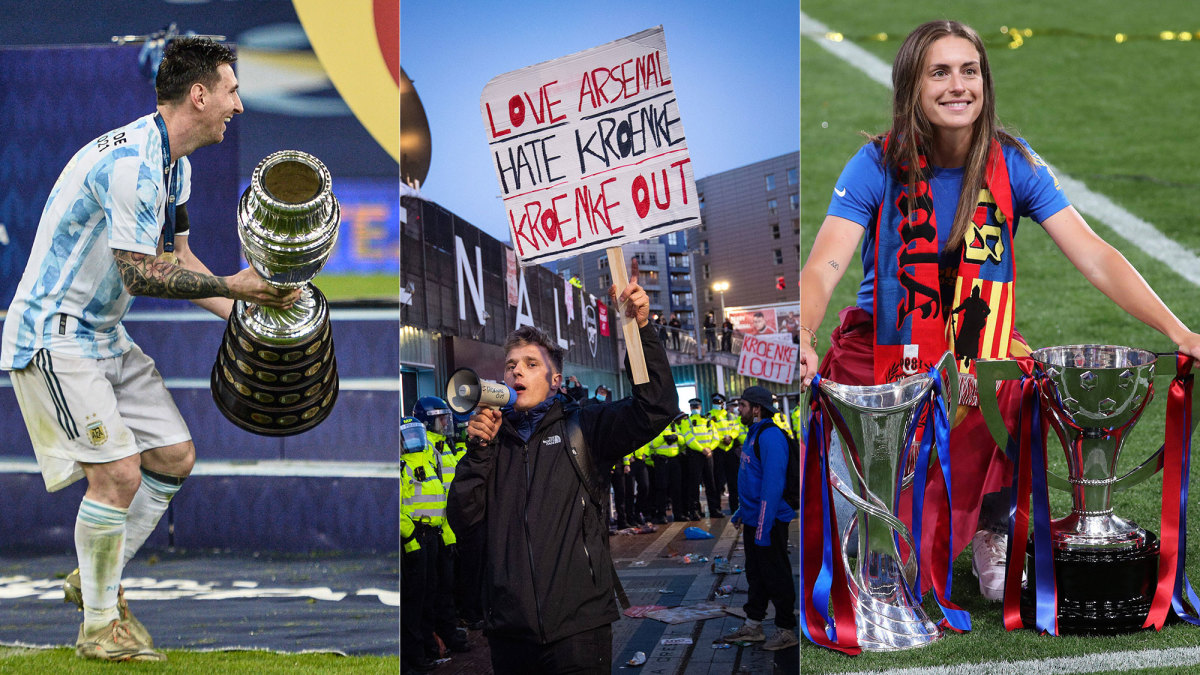
The Super League’s tumultuous and brief existence
The richest clubs in the world delivered the poorest imaginable rollout of a breakaway Super League that was meant to change the game, and in the process we were all treated to a couple of days of twists, turns, protests and retreat. The notion that the "elite" clubs want a bigger slice of the pie did not die with the Super League's demise, but the powers that be saw firsthand how badly they underestimated supporter reaction to their plan to have their clubs play each other in perpetuity. Nine of the original clubs eventually withdrew, but Barcelona, Real Madrid and Juventus remain defiant and insistent on their pursuit, and we surely have not heard the last of their effort, no matter how futile it may (or may not!) prove to be.
Related: Nick Hornby on the Super League's Toll on the Fan-Owner Dynamic
Christian Eriksen’s collapse
The harrowing scene of Eriksen's collapsing to the ground as he suffered cardiac arrest during Denmark's Euro 2020 opener vs. Finland won't soon be forgotten. Fortunately, Eriksen has enjoyed a complete recovery, has returned to individual training and could even potentially play again—though not in Italy, due to the heart-monitoring device he had implanted. The heroes that day—Denmark captain Simon Kjær for his immediate action, and the medics who rushed to assist—quite literally saved Eriksen's life. Of considerably less consequence, Denmark embarked on an emotional run to the semis (its games in Copenhagen were a short drive from the hospital where Eriksen was recuperating), very nearly completing a storybook title triumph. Nevertheless, the Danes went on to become the second team to qualify for the 2022 World Cup, and whether Eriksen is in Qatar or not, he'll forever be a source of inspiration.
Related: The Collapse That Put Everything in Perspective
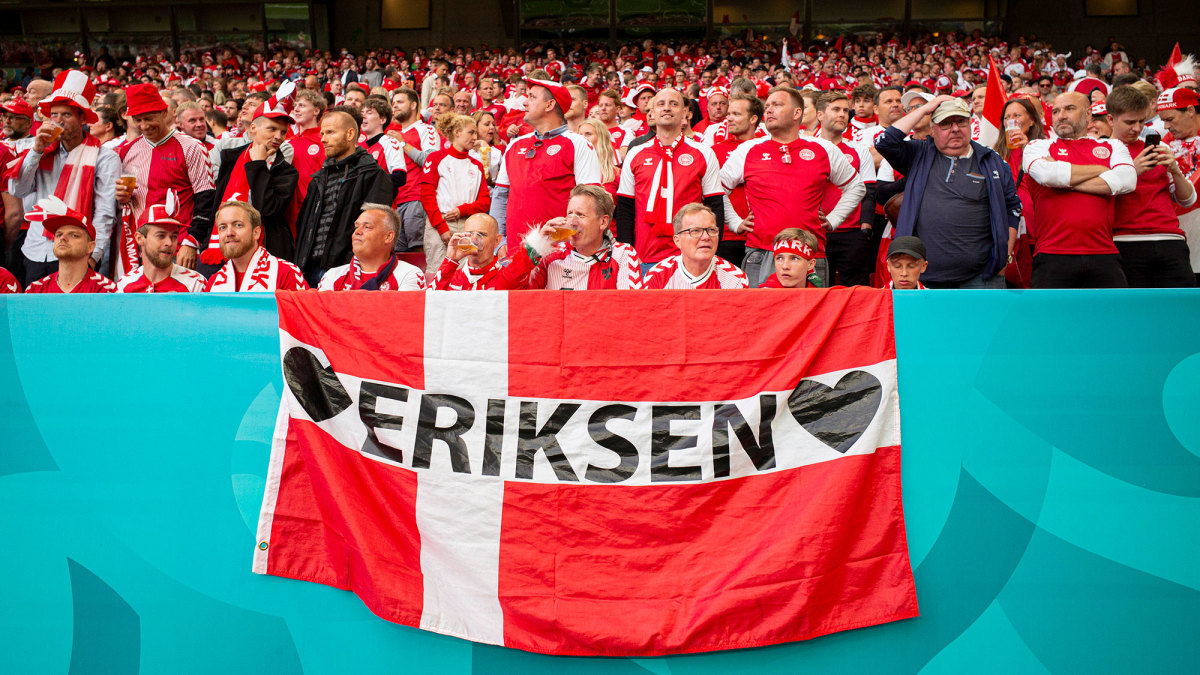
Italy’s revival at the Euros
Forza Italia! After missing the 2018 World Cup, Italy completed its climb back to the top by winning the Euros, outlasting England in penalty kicks at Wembley Stadium to lift the trophy. It was a great success story for Roberto Mancini, whose balanced and resilient squad evaded Austria in extra time, downed world No. 1 Belgium and edged Spain in PKs before overcoming an early England strike in the heart of enemy territory. Whether Italy can replicate that at the World Cup next year remains to be seen—but first it has to get there. A failure to top its qualifying group means another go-around in UEFA's playoffs, and a crushing draw means that it'll likely need to get through Portugal just to secure a berth. Missing a second straight World Cup would surely undo the goodwill fostered by a team of deserving winners last summer.
Related: The Azzurri's Ascent to European Champions
Messi’s Argentina wins Copa América
The wait finally ended for Argentina and Lionel Messi. After going without a major trophy since the 1993 Copa América, Argentina won the 2021 edition, beating Brazil at the Maracanã of all places to get the job done. Messi was immaculate in the run to the final, and even though he didn't have his finest match against the Seleção, the achievement, along with what he was able to accomplish with a subpar Barcelona side, led to his record seventh Ballon d'Or. The record-setting Robert Lewandowski may have had a fair shout at the individual honor, but given everything Messi had previously endured with the national team—final defeats in the '14 World Cup and '15 and '16 Copa América tournaments—this one trophy carried great meaning, both for Argentina's supporters and for Messi's legacy.
Related: Messi and Argentina Finally Have Their Peace
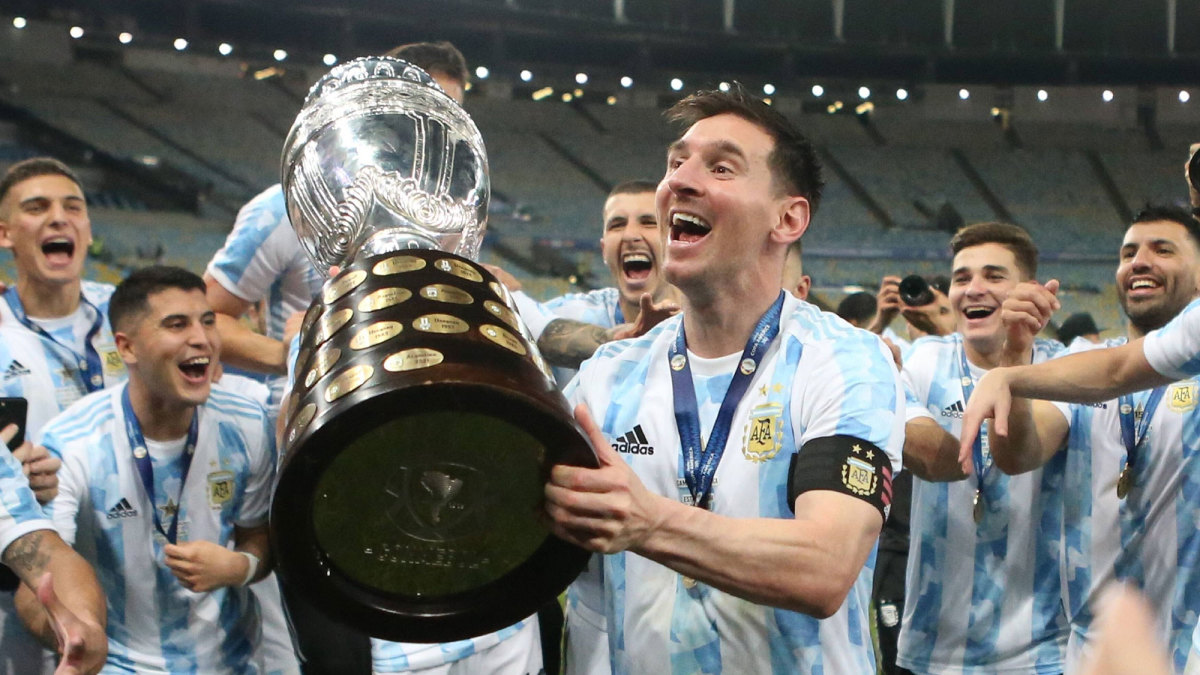
The craziest summer transfer window ever
Nobody was off-limits in the summer of 2021. Messi's move to PSG as part of the French club's sensational spree was driven by Barcelona's ineptitude and financial ruin, but his was just one of a slew of headlining transfers across Europe. Cristiano Ronaldo, Romelu Lukaku, Jadon Sancho, Antoine Griezmann, Jack Grealish and Achraf Hakimi were all sold, with Ronaldo's sudden reunion with Manchester United capping an absolute whirlwind of a window that threatened to include Harry Kane and Kylian Mbappé as well. Shake up a snow globe and see where the pieces fall—in many ways, that's what the summer felt like among the elite tier of talent across Europe's top clubs.
Related: The Mad Libs, Norm-Shattering Summer Transfer Window
NWSL’s long overdue reckoning
For all of the strides that NWSL has made in fortifying itself as a stable and reputable league, it's all been overshadowed by uncovered stories of abuse, scandal and toxic culture. That much was made clear through a series of investigations, most notably The Athletic's piece on former Portland Thorns and North Carolina Courage coach Paul Riley and the allegations levied against him by Mana Shim and Sinead Farrelly. Separately, malfeasance took down officials and/or coaches with NJ/NY Gotham FC, OL Reign, Racing Louisville, the Chicago Red Stars and the Washington Spirit, with the latter overcoming the ouster of coach Richie Burke amid allegations of abuse and an ownership squabble amid stories of toxicity to improbably win the league title. Perhaps most significantly, commissioner Lisa Baird took the fall for failing to follow up on complaints about Riley. The league aims to move forward with new leadership and, ideally, a place where players can feel protected and not threatened by the power dynamic that has permeated for far too long. The brief league stoppage and scenes of unity among players when matches resumed were particularly powerful.
Related: There's No Hiding for NWSL's Culpable Leadership
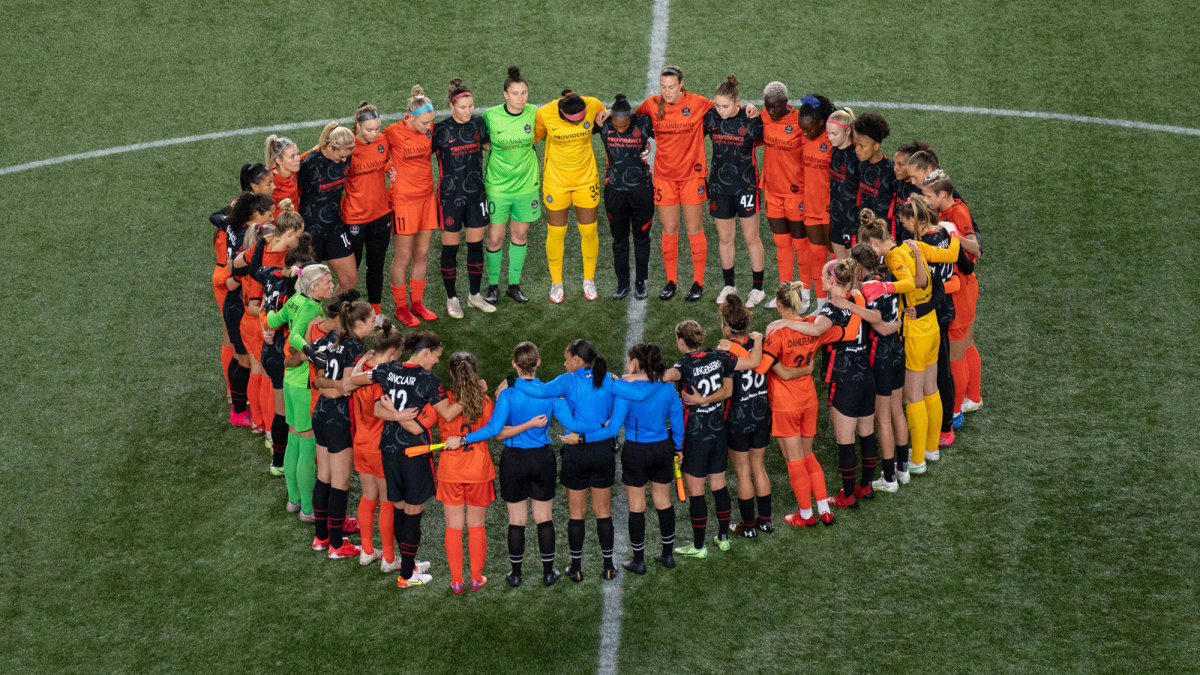
USMNT’s hat trick vs. Mexico
The U.S. men's national team's year was defined by three competitive wins over rival Mexico in a five-month span—three wins that serve as a foundational piece of what a young and potential-filled generation is seeking to accomplish. The Nations League final featured tremendous drama, with Weston McKennie's header forcing extra time, Christian Pulisic's penalty kick giving the U.S. the lead (followed by a defiant celebration) and Ethan Horvath's penalty save preserving the win. Later in the summer, a U.S. team of a considerably different makeup edged Mexico in extra time again, on Miles Robinson's header. The cherry on top was bringing back Dos a Cero in November's World Cup qualifier, with Pulisic coming off the bench to score the eventual game-winner (and ramping up the trash talk with another iconic celebration) before McKennie's narrative-reviving finish. Three wins, two trophies and one big statement.
Related: U.S.'s Dos a Cero Revival Hits All the Right Notes
Barcelona’s dominant women
At least one team at Barcelona is dominant, ruthless and run efficiently. Barcelona Femení absolutely destroyed its domestic competition (33-1-0, 167 goals scored, 15 conceded; only a June defeat to Atlético Madrid prevented a perfect season) and then won its first Champions League title by doing to Chelsea what Lyon had done to it two years before. Lyon scored four times in the first 30 minutes of the 2019 final, giving Barça a rude awakening to the top tier. In the '21 edition, Barcelona scored four in the first 36 minutes to become the preeminent club on the continent. Alexia Putellas ran away with the Ballon d'Or, and her side is at it again, boasting a perfect 15-0-0 record in Spain (with five of the league's top eight goalscorers) and having a berth in the Champions League quarterfinals (against Real Madrid) in tow as the year comes to a close.
Related: Barcelona's Putellas Wins Women's Ballon D'Or
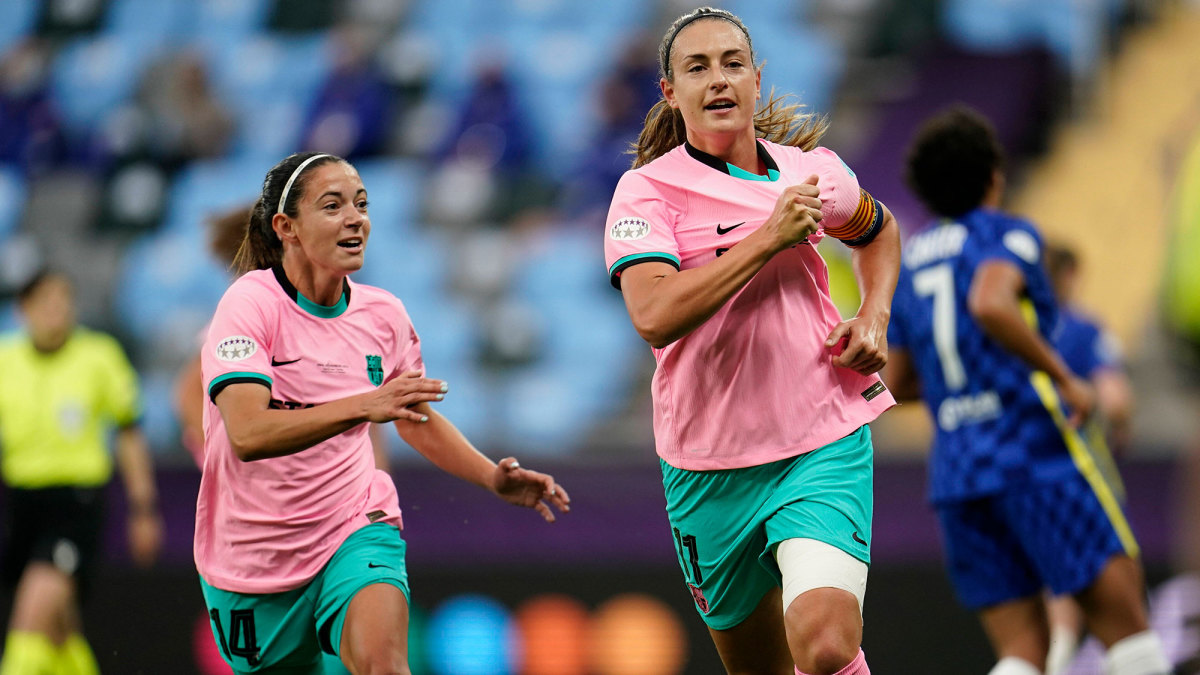
Chelsea’s midseason manager magic strikes again
It was déjà vu of sorts for Chelsea, which rode a midseason manager change to a Champions League title for the second time in the last decade. This time, it was Frank Lampard—a centerpiece on that 2012 team and its captain in that final—making way for Thomas Tuchel, who overhauled the club's approach and molded it into a European champion. It didn't hurt that Chelsea was one of the select few clubs that could afford reinforcements during the pandemic, giving Tuchel the proper pieces with which to work, but the change at the top made all the difference. U.S. star Christian Pulisic also became the first American male to play in and win a Champions League final in the process—and he nearly scored vs. Man City in Porto after coming on as a substitute.
Related: How Chelsea Reclaimed the Champions League Throne
FIFA’s biennial World Cup push
This story will bleed into a World Cup year, as FIFA looks to consolidate its hold over the sport it governs. But what began as a feasibility study has turned into an all-out PR offensive to stage men's and women's World Cups every two years, with Arsène Wenger and a cast of ex-players and individuals of importance from across the sport tabbed with passing on the message. It's been met with staunch resistance, most notably from UEFA and CONMEBOL. A World Cup without teams from Europe and South America isn't much of a World Cup at all, and it'll be fascinating to see which direction things head in the coming year, with a March FIFA meeting the next checkpoint in this saga that will determine the future of the sport's showpiece events.
Related: The Overlooked Consequences of a Biennial World Cup on National Teams
More Soccer Coverage:
